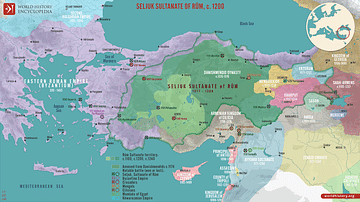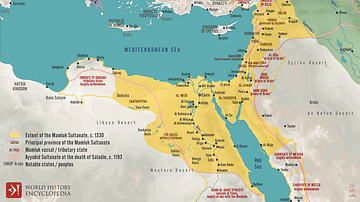Illustration
A map illustrating the empire and campaigns of Timur (from the Chagatai word for iron) at its biggest extent before his death in 1405. Timur the Lame (Timur-i Leng from Persian, Tamerlane as it had evolved in English or Timūr Gurkānī, son-in-law following his marriage into Genghis Khan's family) was a 14th-century (1336 – 1405) Muslim conqueror of a Turco-Mongol descent who, at the peak of his Central Asian Timurid Empire, had defeated the major powers of the day - the Mamluks, Ottomans, the Sultanate of Delhi, and the Golden Horde and invaded, among others, Persia, Mesopotamia, Russia, Georgia, India, Syria, and Turkey. After his death preparing to invade the Ming Dynasty of China, the empire, which was never more than an expression of his personal ambition and dominance, quickly fell into disputes and civil wars and crumbled.
About the Author
Cite This Work
APA Style
Netchev, S. (2023, August 07). The Empire of Timur the Lame, c. 1404 CE. World History Encyclopedia. Retrieved from https://www.worldhistory.org/image/17689/the-empire-of-timur-the-lame-c-1404-ce/
Chicago Style
Netchev, Simeon. "The Empire of Timur the Lame, c. 1404 CE." World History Encyclopedia. Last modified August 07, 2023. https://www.worldhistory.org/image/17689/the-empire-of-timur-the-lame-c-1404-ce/.
MLA Style
Netchev, Simeon. "The Empire of Timur the Lame, c. 1404 CE." World History Encyclopedia. World History Encyclopedia, 07 Aug 2023. Web. 23 Oct 2024.








